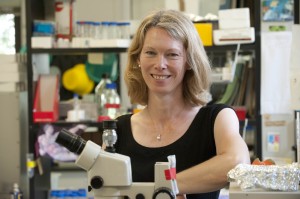By: Stephanie Levi, PhD
 Victoria Prince, Ph.D. is no stranger to a bustling research career. As a developmental biologist in the University of Chicago’s Department of Organismal Biology and Anatomy, Dr. Prince leads a team of researchers in exciting research that focuses on the developmental biology of the pancreas and brain stem. In recent years, leadership has taken a new shape for her in the form of university administration. Dr. Prince assumed the role of Associate Dean and Director of the Biological Sciences Division’s (BSD) Office of Graduate Affairs in 2010. In this role, Dr. Prince has expanded her reach as a mentor to graduate students and early-career researchers, catalyzing a new kind of career development for the next generation of scientists.
Victoria Prince, Ph.D. is no stranger to a bustling research career. As a developmental biologist in the University of Chicago’s Department of Organismal Biology and Anatomy, Dr. Prince leads a team of researchers in exciting research that focuses on the developmental biology of the pancreas and brain stem. In recent years, leadership has taken a new shape for her in the form of university administration. Dr. Prince assumed the role of Associate Dean and Director of the Biological Sciences Division’s (BSD) Office of Graduate Affairs in 2010. In this role, Dr. Prince has expanded her reach as a mentor to graduate students and early-career researchers, catalyzing a new kind of career development for the next generation of scientists.
Dr. Prince began her research career at North London’s National Institute for Medical Research, where she studied genes that establish specific parts of the body along the body’s axis. A short course in embryology with two soon-to-be Nobel laureates introduced her to a new model system that had not yet gained popularity but has proven extremely useful in a variety of fields—zebrafish. Using this model system, Dr. Prince and her lab have developed techniques and pioneered discoveries that have illuminated the development of the pancreas and brain stem, garnering global interest. Their work seeks to illuminate the establishment of neural circuitry, and understand how the pancreas is built during embryo development to ultimately generate transplantable pancreatic islets from stem cells to cure diabetes.
Such ambitious goals in research have paralleled Dr. Prince’s role as the Associate Dean and Director of the BSD’s Office of graduate affairs. Dr. Prince has worked with the University’s Career Advancement office to introduce an innovative set of programs to support students who are considering a wide variety of post-graduate careers, including alumni visits and workshops for students and post-docs that go outside traditional careers and explore a more diverse selection of career options. “Sometimes scientists are resistant to taking on what they see as service roles, but service and leadership turn out to be two sides of the same coin,” Dr. Prince says. Exposing students and post-doctoral scholars to diverse career options helps them explore interests that leverage their experience as researchers, while cultivating ways to be of service through their myriad experiences. Dr. Prince is an excellent example for other scientists of all levels, not only for what it has enabled her to do for her community, but also for how it has been of service to her. “My administrative role has benefitted me by giving me a much greater understanding of the intricacies of how a university runs, and allowing me to meet a fantastic new cadre of colleagues from outside of the biological sciences.”
Dr. Prince emphasizes that administrative roles are a great choice for female scientists, and female scientists are a great choice for these roles, particularly timely in light of online buzz about the dearth of women in administration roles in research environments. “Taking on such roles allows women to have a broader, or at least a different, impact than can be achieved solely through developing a strong research program. Another excellent reason for women to take on such leadership roles is to provide strong role models for the next generation.” University administrators need to be mindful of issues that may be unique to women in science, she cautions. “Searches need to be much more proactive if women candidates are to be convinced to apply for and (even more challenging) accept upper level leadership jobs. Strategies that work well enough to attract male candidates will not necessarily work for female candidates, so search committees, and particularly the senior leadership behind them, need to do their homework and be willing to go the extra mile if they are serious about placing excellent women scientists into leadership positions.”
So, what is the secret to her success? Dr. Prince dispenses excellent advice: Just say no. “[Being] empowered to do so when appropriate can save new assistant professors from too much busy work and allow them to focus on the most critical task of establishing their research program.” She has advice for students as well: “…Focus on the questions they are passionate about and that will get them up in the morning, rather than worrying too much about whether a particular area of research will be trendy, and where the funding will lie ten years down the road. I suppose this is a form of living in the moment, but I really think research is too hard to do if you aren’t excited about the daily experiments, and none of us have a crystal ball.” A final bit of wisdom is good for all of us: “’Everything in moderation, including moderation.’ Sometimes you really should just go for it.”
